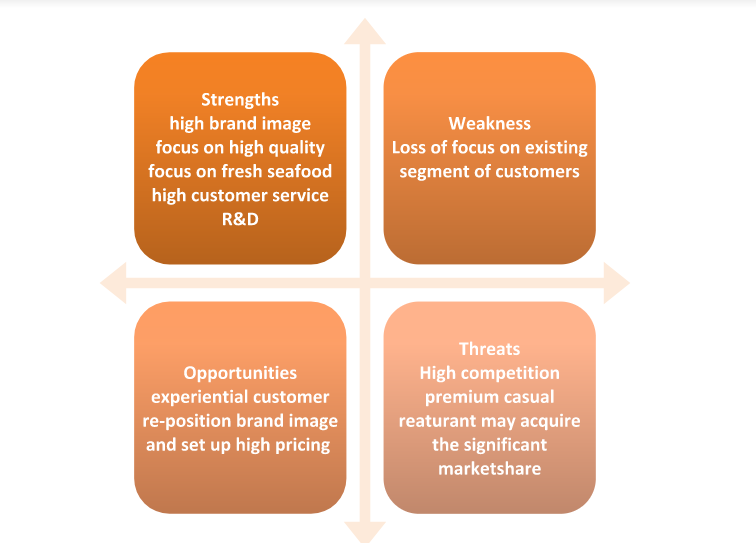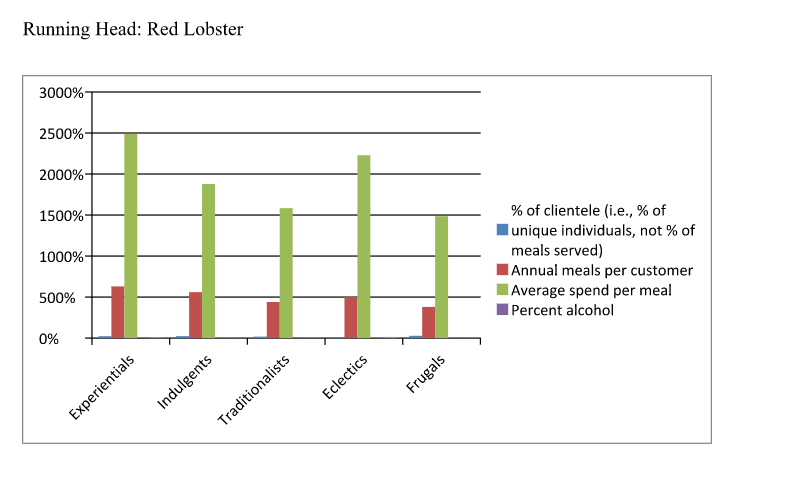Red Lobster Case Solution

red lobster case solution
Problem Identification:
The marketing team of Red Lobster had made a research study to expose some psychographic
segments. The new findings of the marketing team gave Lopdrup an insight about customer
segments. Lopdrup was surprised by the segmentation study and expected that this situation
could be an opportunity to enlarge that segment further.
The study reveals the new customer segment, Experiential, who were the prospect for the
company and expected as the best customers for a casual dining chain. Experiential also
considered as the most profitable customer segment. Therefore, in order to get the better results,
Lopdrup wanted to respond appropriately to this segmentation study.
However, Lopdrup required elaborating all options more profoundly which were based on some
considerations such as segmentations, positioning, promotion and etc. Furthermore, before
deciding he was confronted with the situation that whether Red Lobster should change its focus
to serve experiential and what strategies the company would need in order to shift its strategy to
attract the experiential segment.
3. Alternatives:
Staying in the current strategy (ongoing strategy):
Red Lobster should continue its going strategy together by attracting experiential segment group
without making any change. The management should not change its current strategy as it has
proven to be successful, however, the management of Red Lobster could include some
component that could help the company to attract the experiential. In addition, segmentation
should also be remaining the same. The company has currently four large groups of customers
and the current marketing and promotional strategy has helped a lot to bring many customers
from these segments. Therefore, changing its focus to new single segment would not seem
effective. The brand positioning around fresh seafood has been the reason for Red Lobster
success in every segment.

red lobster case analysis
Focusing on the Experiential:
The management of the company should focus on the new customer segment of the market. The
company could implement new strategies to attract the large segment of experiential. The
company should also re-position its brand in order to effectively target the experiential group of
customers. This would require building new marketing and promotional strategies to satisfy the
need of the new market segment. It is expected that the experiential are the best customers to
target for a casual dining and have less price sensitive as compared to other segments. Therefore,
it would be profitable for Red Lobster to expand the business further around experiential.
However, this strategy would require investing heavily to rebuild the new business image.
4. Evaluation of Alternatives:
The first alternative is that the company should focus on its current market segment together
with attracting new segment. The company’s decision of staying on the ongoing strategy would
enable the company to increase its market share and profitability by targeting four segments of
the customers at once. In addition, it would not require investing heavily in making new
strategies. The company could attract experiential by its current positioning and marketing
strategy.
Furthermore, the management of Red Lobster should focus on adding some key elements in their
current policy in order to effectively target and attract experiential. Adding special wine menu
could help the company to satisfy the desire of experiential. In addition, it would also enable Red
Lobster to continue expanding its business without making any significant change in its strategy
nor it would require re-positioning its brand image. The company would benefit to satisfy the
wants of both current customers and the new customers.
The second alternative is to focus on the new customer segment without paying attention to the
current segment. This would require developing and implementing new strategies to successfully
attract the new customers. In addition, the company would also require investing profoundly in
creating new brand image and to renovate its restaurant environment according to the
experiential. However, it would be difficult and challenging for the company to make the new
image as it would cause employees reluctance to change and turnover. The company had
recently changed and repositioned its brand image therefore, it would be difficult for the
employees to accept the change on such sudden basis.
Furthermore, the company would also be required to give up its significantly profitable business
and might lose loyal customers’ trust and attention and cased negative image in the market.
Moreover, experiential have high culinary standards and high service and atmosphere
expectation, therefore, the company would also change its restaurant’s atmosphere. Red Lobster
may also require new and high competent staff that could provide high standard of service to the
new customer segment. The new positioning would also need to build in the mind of experiential
so as to present the excellent dining experience. The new marketing and advertising strategies
would also need to be developing to target the experiential customers.
However, the company would be allowed to reduce its price promotions since experiential are
less sensitive to price thus, the company would be able to charge the desire prices. Finally, Red
Lobster would require adding more and special items in its menu card which may be create
complex situation for the company.
Therefore, after evaluating both the alternatives, it is concluded that the first alternative that is
staying on the ongoing strategy would be beneficial for the company to initiate. This alternative
would help the company to target all the four segments effectively and further increasing its
market share and profitability.
After analyzing the issues and evaluating proposed alternative, it is recommended to the
company that it should stay on its current strategy of focusing all the segments in the market.
Therefore, staying on the ongoing strategy is the best alternative for the company that it should
follow in order to lessen the chances of facing complex situation. By applying this strategy, the
company would be able to significantly increase its market share and to serve all the four
segments of the customers. However, the company would only require to add little components
its strategy to attract experiential such as add vine and other items in its menu card.
Furthermore, the company had significantly changed its previous brand image and focused to
provide high quality and fresh seafood item which is also acceptable by experiential. The current
strategy seems suitable for Red Lobster to carry out. In addition, it doesn’t require to further
invest in positioned the brand. Therefore, by staying on its current strategy Red Lobster would be
able to generate higher revenue and to become a major player in the sea food industry.
Red Lobster, 40-year-old chain of seafood restaurants, has just completed a market study to identify opportunities to change their target customer segment. The chain is in the final stages of the 10-year plan for the rejuvenation of the General Director Kim Lopdrup. When he took over as CEO in 2004, closing the chain restaurants and suffer lower same store sales and reduced customer satisfaction. But in 2010, even in a recession, the state of the circuit is improved. Recent market research study showed, surprisingly, that 25% of clients are Red Lobster "experientials," people who come to the "good evening" and not traditional customer core Red Lobster, which has come from the craving for seafood. If this news is Lopdrup do anything differently?
To increase their effectiveness, color cases should be printed in color. "Hide
by David E. Bell, Jason Riis Source: HBS Premier Case Collection 26 pages. Date Published: September 8, 2010. Prod. #: 511052-PDF-ENG











